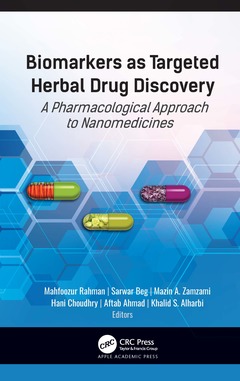Description
Biomarkers as Targeted Herbal Drug Discovery
A Pharmacological Approach to Nanomedicines
Coordinators: Rahman Mahfoozur, Beg Sarwar, Zamzami Mazin A., Choudhry Hani, Ahmad Aftab, Alharbi Khalid S.
Language: English
Subjects for Biomarkers as Targeted Herbal Drug Discovery:
Keywords
Delivery System; Pentacyclic Triterpene; Herbal drug discovery; Nigella Sativa; Nanotechnological application; NLC; Diseases management; SLNs; Disease treatment; GA; Biomarkers; AIA Rat; Herbal Drug; Black Cumin; Candida Biofilm; Rosmarinic Acid; BMDCs; Curcumin Nanoformulation; EGCG; PCL; Drug Delivery Systems; Sativa Extract; MC; Methylcellulose; SNEDDS; CIA Rat; BACE1; UA; Promastigote Phase; Nanoemulsion Gel
Publication date: 09-2023
· 15.6x23.4 cm · Paperback
Publication date: 07-2021
· 15.6x23.4 cm · Hardback
Description
/li>Contents
/li>Biography
/li>
This new volume looks at the applications of biomarkers as important tools for herbal drug discovery, presenting research on phytoconstituents with advanced nanotechnological applications for healthcare benefits.
Herbal drug discovery based on biomarkers is an emerging area in complementary and alternative medicine that has tremendous potential in healthcare. Conventional medications have limited efficacy and high toxicity, whereas herbal drugs are said to provide wide structural diversity that is not usually seen with conventional/synthetic drug molecules. Recognition of various herbal constituents, such as terpenoids, fatty acids, flavonoids and steroids, are well explored in the management and treatment of various disorders in this volume. These agents target various biomarkers such as nitric oxide (NO), cytokines, chemokines, adhesion molecules, NF- k?, lipoxygenase (LOX), and arachidonic acid.
Biomarkers as Targeted Herbal Drug Discovery: A Pharmacological Approach to Nanomedicines discusses phytoconstituent-based nanotherapeutics with applications for some specific health issues, such as arthritis, leishmanicidal, cardiovascular diseases, cancer, ocular disorders, etc.
1. Inflammatory Biomarkers: An Important Tool for Herbal Drug Discovery 2. Herbal Anti-Arthritic Drug Discovery Tool Based on Inflammatory Biomarkers 3. Curcumin Nanomedicines and Their Application in the Management of Disease 4. Ursolic Acid: A Pentacyclic Triterpene from Plants in Nanomedicine 5. Phytoconstituent-Centered Byproducts and Nanomedicines as Leishmanicidal Scavengers 6. Delivery of Herbal Cardiovascular Drugs in the Scenario of Nanotechnology: An Insight 7. Nigella sativa Encapsulated Nano-Scaffold and Their Bioactivity Significance 8. Phytoconstituent-Loaded Nanomedicines for Arthritis Management 9. Phytoconstituent-Based Nanotherapeutics as Ocular Delivery Systems 10. Rosmarinic Acid: A Boon in the Management of Cardiovascular Disease 11. Long-Term Toxicity and Regulations for Bioactive-Loaded Nanomedicines 12. Resveratrol-Loaded Phytomedicines for Management of Cancer 13. Thymoquinone-Loaded Nanocarriers for Healthcare Applications
Mahfoozur Rahman, PhD,is Assistant Professor in the Department of Pharmaceutical Sciences, Faculty of Health Science, Sam Higginbottom University of Agriculture, Technology and Sciences (SHUATS), Allahabad, India. He has published over 100 journal papers as well as book chapters and books. He also serves as an editorial board member and guest editor for several journals.
Sarwar Beg, PhD, is Assistant Professor in the Department of Pharmaceutics, School of Pharmaceutical Education and Research, Jamia Hamdard, New Delhi, India. He has over a decade of teaching and research experience in the field of pharmaceutics and biopharmaceutics. Dr. Beg was formerly a Research Scientist at Jubilant Generics Limited, India.
Mazin A. Zamzami, PhD, is Associate Professor in Clinical Biochemistry and the Chairman of the Biochemistry Department, Faculty of Science at King Abdulaziz University, Kingdom of Saudi Arabia. Previously, Dr. Zamzami directed the Serology Department as well as worked as a senior laboratory technician in the Clinical Biochemistry Department at Al-Thagher Hospital, Jeddah, Saudi Arabia.
Hani Choudhry, PhD,is Assistant Professor of Cancer Genomics and the Head of Cancer and Mutagenesis Unit at the King Fahd Center for Medical Research at King Abdulaziz University, Saudi Arabia, as well as a Visiting Assistant Professor at the NIH Center of Excellence in Genomic Science, Center for Personal Dynamic Regulome, School of Medicine, Stanford University, California.
Aftab Ahmad, PhD,is Associate Professor of Pharmacology in the Health Information Technology Department at Jeddah Community College of King Abdulaziz University, Kingdom of Saudi Arabia. He has completed many research projects as a principal investigator funded by the deanship of scientific research of King Abdulaziz University and has published many research articles.
Khalid S. Alharbi, PhD, is Assistant Professor of Pharmacology and T




